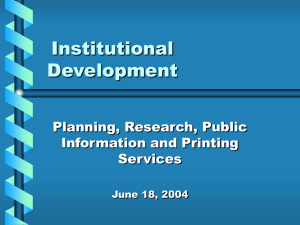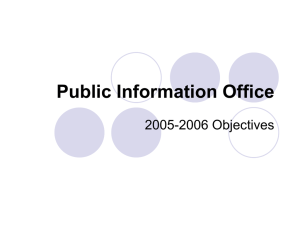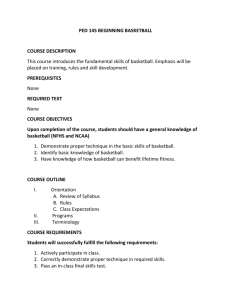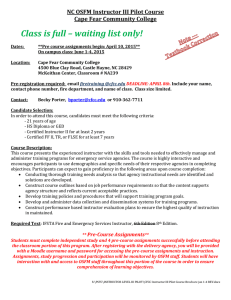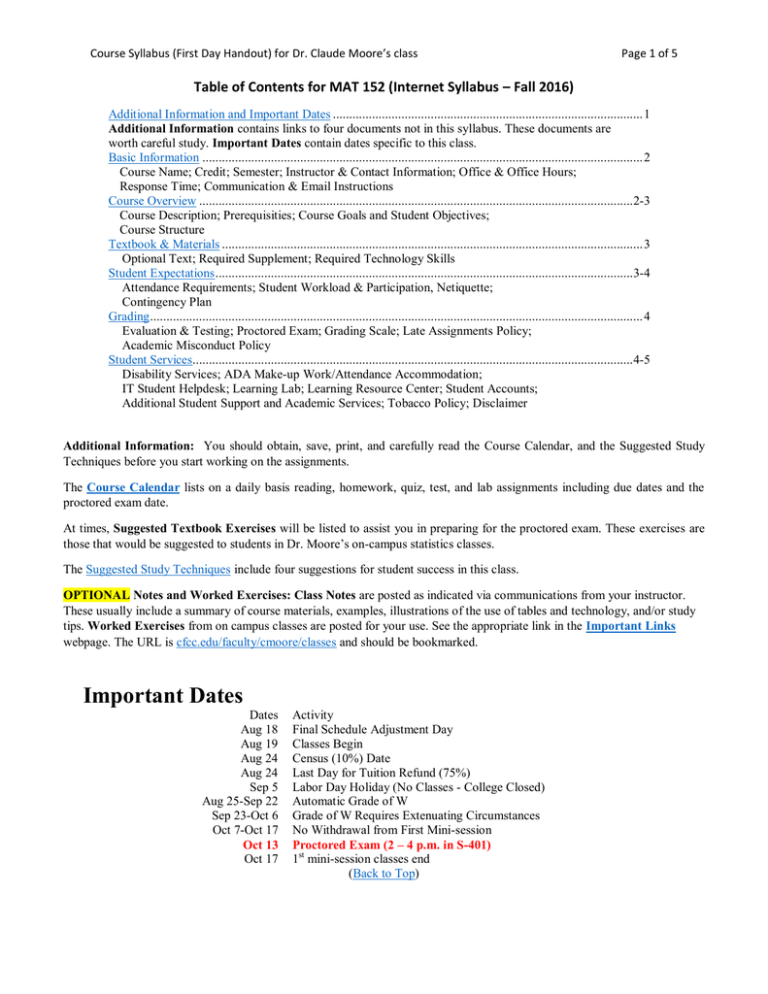
Course Syllabus (First Day Handout) for Dr. Claude Moore’s class
Page 1 of 5
Table of Contents for MAT 152 (Internet Syllabus – Fall 2016)
Additional Information and Important Dates ............................................................................................... 1
Additional Information contains links to four documents not in this syllabus. These documents are
worth careful study. Important Dates contain dates specific to this class.
Basic Information ....................................................................................................................................... 2
Course Name; Credit; Semester; Instructor & Contact Information; Office & Office Hours;
Response Time; Communication & Email Instructions
Course Overview .....................................................................................................................................2-3
Course Description; Prerequisities; Course Goals and Student Objectives;
Course Structure
Textbook & Materials ................................................................................................................................. 3
Optional Text; Required Supplement; Required Technology Skills
Student Expectations ................................................................................................................................ 3-4
Attendance Requirements; Student Workload & Participation, Netiquette;
Contingency Plan
Grading ....................................................................................................................................................... 4
Evaluation & Testing; Proctored Exam; Grading Scale; Late Assignments Policy;
Academic Misconduct Policy
Student Services.......................................................................................................................................4-5
Disability Services; ADA Make-up Work/Attendance Accommodation;
IT Student Helpdesk; Learning Lab; Learning Resource Center; Student Accounts;
Additional Student Support and Academic Services; Tobacco Policy; Disclaimer
Additional Information: You should obtain, save, print, and carefully read the Course Calendar, and the Suggested Study
Techniques before you start working on the assignments.
The Course Calendar lists on a daily basis reading, homework, quiz, test, and lab assignments including due dates and the
proctored exam date.
At times, Suggested Textbook Exercises will be listed to assist you in preparing for the proctored exam. These exercises are
those that would be suggested to students in Dr. Moore’s on-campus statistics classes.
The Suggested Study Techniques include four suggestions for student success in this class.
OPTIONAL Notes and Worked Exercises: Class Notes are posted as indicated via communications from your instructor.
These usually include a summary of course materials, examples, illustrations of the use of tables and technology, and/or study
tips. Worked Exercises from on campus classes are posted for your use. See the appropriate link in the Important Links
webpage. The URL is cfcc.edu/faculty/cmoore/classes and should be bookmarked.
Important Dates
Dates
Aug 18
Aug 19
Aug 24
Aug 24
Sep 5
Aug 25-Sep 22
Sep 23-Oct 6
Oct 7-Oct 17
Oct 13
Oct 17
Activity
Final Schedule Adjustment Day
Classes Begin
Census (10%) Date
Last Day for Tuition Refund (75%)
Labor Day Holiday (No Classes - College Closed)
Automatic Grade of W
Grade of W Requires Extenuating Circumstances
No Withdrawal from First Mini-session
Proctored Exam (2 – 4 p.m. in S-401)
1st mini-session classes end
(Back to Top)
Course Syllabus (First Day Handout) for Dr. Claude Moore’s class
Page 2 of 5
Basic Information: This section includes Course Name, Instructor Contact information, and Communications information.
Course Name – MAT 152 Statistical Methods I
Instructor – Dr. Claude Moore Office: S-602-G
Office Hours – MTWTh 10:00-11:00 AM
Credit – 4 semester credit hours
Semester – Fall 2016
Email – cmoore@cfcc.edu
Phone – (910) 362-7135
Virtual Office Hours – TWTh 11:00-12:00 noon
Response Time – Usually, I will respond to your e-mail and/or telephone correspondence within 24 hours during the week and
48 hours on the weekends. Your homework, quizzes, and tests are graded upon submission; however, I will review your final
attempt on quizzes and tests for partial credit consideration after the due date. An announcement will be sent after I complete
that review. Your graded worksheets (labs) will be returned via e-mail within five days after the due date.
Communications & Email Instructions – There will be communications in myCFCC (my.cfcc.edu) throughout the semester.
MyLabsPlus (Pearson MyLabsPlus) will be used for most of the graded assignments. These will include quiz, worksheet (Lab),
and test assignments. Homework assignments are available to assist you in preparing for your quiz and test. You must check
your myCFCC e-mail regularly for communications from me to you that will be to your myCFCC address. Email
communications to me should be to my myCFCC e-mail address: cmoore@cfcc.edu. Whenever you email me, concerning
school, please do the following: (1) Include your course identification and your last name and first initial in the Subject line.
Jane Smith in MAT 152-I01A would have a subject line that includes 152i1-smithj. You may include other appropriate
information in the Subject line if you wish. (2) Include your name in the closing of the email. Also, include a phone number if
you want me to call you. Thanks for your assistance in making this semester productive and enjoyable. NOTE: You should
check your emails in myCFCC and Announcements (click Course Home link and View All Announcements link) in
MyLabsPlus (MLP) frequently – at least daily.
(Back to Top)
Course Overview: This section includes Course Description, Prerequisites, Goal and Objectives, and Course Structure.
Course Description – This course provides a project-based approach to introductory statistics with an emphasis on using realworld data and statistical literacy. Topics include descriptive statistics, correlation and regression, basic probability, discrete
and continuous probability distributions, confidence intervals and hypothesis testing.
Prerequisites – Proficiency in Arithmetic Skills, Intermediate Algebra, and English/Reading. Completion of requirements in
DMA-010, DMA-020, DMA-030, DMA-040, DMA-050, and DRE-098
Course Goals and Student Outcomes – There are three goals and several student outcomes for this course as listed below.
Goal 1 – Apply descriptive statistics to data sets.
1. Distinguish between a population and a sample; distinguish between a parameter and a statistic.
2. Classify the level of measure of data as nominal, ordinal, interval or ratio.
3. Classify a sampling method as random, systematic, convenience, stratified, or clustered.
4. Summarize data in frequency tables, relative frequency tables, and cumulative frequency tables.
5. Construct a histogram, relative histogram, and a stem-and-leaf plot for a data set.
6. Calculate measures of central tendency to include the mean, median, mode, and midrange.
7. Calculate measures of variation to include the range, standard deviation, and the variance.
8. Calculate z-scores to determine whether an event is unusual.
Goal 2 – Calculate probabilities and analyze probability distributions.
1. Apply the addition rule and multiplication rule to calculate various probabilities.
2. Calculate probabilities of binomial distributions and normal distributions.
Goal 3 – Apply inferential statistics to data sets in order to make predictions about the population based on a sample.
1. Calculate an estimate of the population proportion, population mean, and population standard deviation using
confidence intervals.
2. Perform hypothesis testing on claims about a population proportion, a population mean, and a population standard
deviation.
3. Calculate the correlation coefficient and determine the strength of a linear correlation between two variables.
4. Calculate the equation of the regression line given paired data.
Course Structure – This is an online (Internet) class with a proctored exam. The course is set up with scheduled assignments
that must be completed by 11:59 p.m. Eastern Time on or before the assignment due date. Any work not completed on time
will receive a grade of zero. You may work ahead on homework, quiz, and test assignments, but you may NOT submit
Course Syllabus (First Day Handout) for Dr. Claude Moore’s class
Page 3 of 5
assignments after the due date and time. Unless otherwise indicated in Announcements or other Communications to students
from the instructor, this course will cover all materials in Chapters 1 – 10 of the textbook listed. Computer or technology
difficulties are not an accepted excuse for missing work. Each online assignment will be listed with an opening and a closing
date. You have unlimited and untimed attempts on each homework, two 120-minute attempts on each quiz, and one 120minute attempt on each test. Once you open a test or quiz, you must complete the test or quiz in the allotted time as indicated
for each. You will not be able to re-open tests or quizzes after you submit them. Therefore, allow yourself the allotted time
before starting a test or quiz. You will not be able to take extra time on tests or quizzes unless you supply your instructor with
official documentation from the Disabilities Services Office at CFCC, prior to the due date. (See the section "Disability
Services" below.) Technical difficulties are no excuse for late or missed assignments. You may use the computers located
in the Learning Lab of the CFCC Library if you are having problems with your computer, but this is no substitute for your
having a computer of your own available to do assignments. You are expected to check your myCFCC Email and MyLabsPlus
Announcements daily because that is how I will communicate to you about the course. (Back to Top)
Textbook & Materials: This section includes Optional Text, Required Supplement, and Required Technology Skills.
Optional Text – Elementary Statistics Using the TI-83/84 Plus Calculator, 4th edition by Mario Triola, published by Pearson
Addison Wesley. You may purchase the textbook with the access code, or you may purchase the access code and use the online
textbook. Textbook information is available at the CFCC Bookstore website. The URL is cfcc.edu/seadevilstore/
Required Supplement – A MyLabsPlus (MLP) Student Access Code is required to access online assignments. Additionally
you will need a TI-83 or TI-84 calculator. All students enrolled in this class are already listed in the appropriate MLP class.
You can complete your registration with a purchased access code. If you have not purchased the code, you may purchase it
online with a credit card, at the CFCC Bookstore, or use a Temporary Access Code that is available in the course.
1. Go to My Labs Plus. The URL is cfcc.mylabsplus.com
2. Login using your CFCC username (example: nasmith535) and the password, Welcome1
3. Follow the online instructions.
You must complete the Enrollment Verification Assignment in your MyLabsPlus (MLP) component of your course
no later than 11:59 PM EST Wednesday, August 24th, to remain enrolled in the course.
Required Technology Skills – To be successful in this course, students will need to be able to perform the following:
1. Basic Word Processing using MS Word, Google Documents, or a similar program.
2. Save, locate, and organize electronic files and documents.
3. Compose and Reply to Email, including attaching files.
4. Browse the internet by typing web addresses, following links, and using search engines.
Students who are new to or not yet fully comfortable using technology may find helpful free resources at GCFLearnFree.org.
Also, students need a working knowledge of the TI-83 and/orTI-84 series graphing calculator. You may find some useful
calculator tutorials by clicking on the Calculator Tips or the Calculator Tutorial and Videos button in the MLP course.
(Back to Top)
Student Expectations: This section includes Attendance Requirements, Student Workload & Participation, Netiquette, and
Contingency Plan.
Attendance Requirements – You must complete 70% of the course assignments (quizzes, labs, and tests) and take the
proctored final exam to receive credit for this course. Anything less will result in a grade of F. In other words, if you miss more
than 30% of the assignments you will receive an F for the course. If you miss any graded assignment, including proctored
exam(s), you will get a zero for the assignment. There are no makeup dates for missed assignments. Students are “allowed two
days of excused absence each academic year for religious observance required by the faith of the student.” See page 18 of
CFCC 2016-2017 Catalog for more details.
Student Workload & Participation – On campus sections of MAT 152 consist of 3 hours of class and 2 hours of lab time per
week for 4 semester credit hours. Students enrolled in online sections of MAT 152 are expected to be actively studying and
participating in class activities a minimum of 10 hours per week. You should actively participate in the course at least five days
per week. This participation may include but not limited to reading and studying (4-5 hours), working on assignments (4-5
hours), contributing to class discussions (2-3 hours), and other class activities, as appropriate, per week. Students will be held
to the highest standards of language and content in all interactions. This includes emails, online discussions, phone and
personal conversations, and course related content and materials. More netiquette information from CFCC is shown below. For
more in-depth information, visit the Core Rules of Netiquette. The URL is albion.com/netiquette/corerules.html.
Course Syllabus (First Day Handout) for Dr. Claude Moore’s class
Page 4 of 5
Netiquette – When communicating in an online class, posting discussions, sending emails, or course messages, it is important
to remember several rules of etiquette:
1. Avoid language that may come across as strong or offensive.
2. Keep writing to a point and stay on topic.
3. Consider the privacy of others.
4. Do not use inappropriate language or materials.
For more detailed descriptions, please visit Online Learning website for netiquette. The URL is cfcc.edu/online/netiquette/ .
Contingency Plan – It is always possible for technology issues to occur. Servers go down at times. We experience Internet
outages or power losses occasionally. Plan ahead; technology issues are not acceptable excuses for late assignments. Your
lowest one quiz score will be dropped. Your lowest test score will be replaced with your final exam score if it is larger. These
actions are to assist in compensating for any potential technology issues. You may e-mail your worksheets to your instructor at
cmoore@cfcc.edu.
(Back to Top)
Grading: This section includes Evaluation & Testing, Proctored Exam, Grading Scale, Late Assignments Policy, and
Academic Misconduct Policy.
Evaluation & Testing – All homework, quiz, and test assignments are due no later than 11:59 p.m. on or before the due date.
Learning can take place without testing; however, testing is a necessary prerequisite to the fair issuance of grades for this
course. Therefore, you will have three tests (10% each); five online quizzes (4% each); three worksheets (10% each); and a
comprehensive proctored final exam (20%). You have online homework assignments for your practice that do not factor into
your overall course grade. There are No Make-Up or Late Quizzes, Worksheets, or Tests! If you miss an assignment, you
will receive a score of zero (0) for that assignment. Your lowest quiz score and your lowest worksheet (lab) score will be
dropped. Your lowest test score will be replaced with your final exam score if the exam score is larger.
Proctored Exam – There will be one proctored exam that covers Chapters 3 and 5-10. This exam will be administered at the
Cape Fear CC downtown campus on Thursday, October 13, 2016, from 2-4 PM in S-401. (I will supply more information
later.) Any student who does not take the proctored exam will receive a score of zero for the exam. The exam will be paper and
pencil type, and you will be required to show a photo ID to take the exam. If you cannot take the exam during the scheduled
time at the Cape Fear CC downtown campus, you will be required to secure a proctor off campus. You must submit the
appropriate information by 11:30 a.m. on September 22, 2016. The Proctor Request Form is available online as a Google
Form. To access it, click on the Proctor Request Form navigation button. If your site and proctor have not been approved by
October 3, 2016, you will be required to come to CFCC during the scheduled time to take the exam. Failure to take the
proctored exam as described above will result in score of zero. Bring your photo ID (to CFCC or to a proctor), two pencils, t he
pullout sheet of formulas from the book, and your calculator. NO BOOK. (Back to Top)
Grading Scale – The homework, quiz, and test assignments will be administered via the Internet using MyLabsPlus. See the
section Proctored Exam information concerning the proctored exam. The lowest quiz score and the lowest worksheet (lab)
score will be dropped. The remaining graded assignments will count toward your final grade as indicated below.
Each Category Counts x % of your final Course Grade as indicated below:
Quiz (Q) 20%
Worksheets or Labs (L) 30%
Test (T) 30%
Proctored Exam (E) 20%
Overall average = 0.20*Q + 0.30*L + 0.30*T + 0.20*E
Your course grade is based on your overall average as follows:
92 to 100 = A 84 to 91 = B 76 to 83 = C 68 to 75 = D 0 to 67 = F
Late Assignments Policy – All assignments submitted after the due date without prior permission from you instructor will
receive a score of zero.
Academic Misconduct Policy – Any behavior indicating dishonesty, unethical intent or action as specified by CFCC will result
in a grade of “F” for the course. The first time you are observed cheating on an assignment you will receive a score of zero (0)
for that assignment. The second time you are observed cheating you will receive a grade of “F” for the course.
(Back to Top)
Student Services: This section includes Disability Services, ADA Make-up Work/Attendance Accommodation, IT Student
Helpdesk, Learning Lab, Learning Resource Center, Student Accounts, Additional Student Support and Academic Services,
Tobacco Policy, and Disclaimer.
Disability Services – Any student who requests classroom accommodations because of a disability must present documentation
to verify his/her disability. This documentation must be furnished to the Disabilities Service Coordinator, and should be
Course Syllabus (First Day Handout) for Dr. Claude Moore’s class
Page 5 of 5
provided prior to requesting accommodations by the instructor. On a confidential basis, the student, disabilities services, and
the instructor will determine the appropriate accommodations following documentation. Accommodations will be provided in a
manner that is consistent with the objectives, outcomes, and academic standards of the course. Absences must not exceed class
attendance policy. Disability Support Services Office is located in the Union Station building, room U-218, phone (910) 3627158. More information is available at the Disability Services Website. The URL is http://cfcc.edu/disabilityservices/
ADA Make-up Work/Attendance Accommodation – If a student is making satisfactory progress in a course and provides
documentation which supports that an absence is related to a documented disability, the absence should not be counted against
the student. You can get more information from the Disability Services Office in the Union Station Building or online. The
URL is http://cfcc.edu/disabilityservices/attendance-make-up-work-procedure/
IT Student Helpdesk – IT Services Student Helpdesk provides first-level technical support to all students of Cape Fear
Community College. They are available to assist students with basic computer and technical needs, including logging into
Blackboard, myCFCC, and WebAdvisor. You can get more information including locations, contact information, and hours of
operation online. The URL is http://cfcc.edu/studenthelpdesk/
Learning Lab – The Learning Lab at CFCC can provide Writing Assistance, Computer Competency Skills, and Tutoring. The
Learning Lab is located in the Learning Resource Center (LRC). You can find more information online. The URL is
http://cfcc.edu/learninglab/. Extra help is available at the Math Lab that is located in Room S-606, in the S (McLeod) building.
You may receive assistance without an appointment and small group tutoring with an appointment. Find the locations and
hours of operation online. The URL is http://cfcc.edu/learninglab/locations-and-hours-2/ . You or your instructor will have to
fill out a form the first time you use the Math Lab. You are encouraged to get assistance from the Math Lab on a regular basis
if you are having difficulty with your math course materials.
Learning Resource Center – The LRC or Library provides students with the following resources: Books/Materials, Course
Reserves, Computer/Internet Access, Online Databases/Journals, Group Study Space, Quiet Study Space, and other
information and assistance. The LRC is located on the 2nd Floor of the L-Building (Downtown Campus) or on the 1st Floor of
the McKeithan Center (North Campus) and can be found online. The URL is http://cfcc.edu/lrc.
Student Accounts – Your myCFCC account is a single username and password for all of your CFCC network accounts: email,
WebAdvisor, Blackboard, campus computer access, course software packages, and more. The email account provided to you
(yourusername@mail.cfcc.edu) is used for all official communication with CFCC instructors and staff. Some information
will ONLY be sent by email and not by postal mail, so it is very important that you check this account. This account may also
be used for personal mail, but is subject to the CFCC Acceptable Use Policy. The URL is http://cfcc.edu/aup/. To access this
account, use the link to the portal near the top of the cfcc.edu website or go directly to my.cfcc.edu. Login and click the Email
link. Be sure to logout of your account in each service you may have opened (email, Blackboard, etc.) when you leave a shared
computer, otherwise it is possible for the next user of the computer to access your information.
Additional Student Support and Academic Services – For a list of CFCC Student Support and Academic Services, please visit
the student support website. The URL is http://cfcc.edu/online/student-support/ .
Tobacco Policy – Cape Fear Community College has set the following 100% tobacco free campus policy, to be implemented
on August 1, 2009. (More complete information is available on page 41 of the CFCC 2016-2017 Catalog.)
Use of tobacco is prohibited by students, staff, faculty, or visitors:
in all campus buildings, facilities or property owned or leased by Cape Fear Community College and outside areas of
the campus;
on campus grounds, facilities, or in vehicles that are the property of the college;
at lectures, conferences, meetings, athletic, social and cultural events held on college property;
for the purposes of this policy, tobacco is defined as any type of tobacco product including, but not limited to,
cigarettes, cigars, cigarillos, pipes, bidis, hookahs, smokeless or spit tobacco or snuff, e-cigarettes or any product
simulating smoking instruments;
except at a specific location(s) on the North Campus as approved by the College President due to unsafe conditions
going off-campus.
Disclaimer – Information contained in this syllabus was, to the best knowledge of the instructor, considered correct and
complete when distributed for use at the beginning of the semester. The instructor reserves the right, acting within the policies
and procedures of Cape Fear Community College, to make changes in course content or instructional techniques without notice
or obligation.
(Back to Top)

